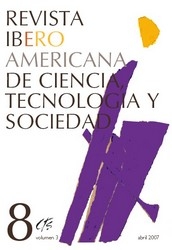Os Problemas da Ciência e do Poder
DOI:
https://doi.org/10.52712/issn.1850-0013-944Palavras-chave:
política científica, política tecnológica, poder, valores culturais, valores sociaisResumo
Este artigo realiza, a partir de uma perspectiva filosófica, um percurso sobre a articulação entre ciência e poder. Para isso, situa a política científica dentro da esfera mais ampla das diversas políticas públicas e apresenta uma revisão de sua história. Além disso, são discutidas as relações dessa política com diversos valores culturais e sociais, bem como as tensões que podem surgir dessas interações. Por fim, aborda-se a forma como a política científica expressa a confrontação entre interesses divergentes e como esses interesses podem ser compatibilizados com a busca por equidade e democracia.
Downloads
Referências
ALBORNOZ, Mario (1996): “De la anomalía argentina a una visión articulada del desarrollo en ciencia y tecnología”, Redes, Nº 7.
ALBORNOZ, Mario (1997): “La política científica y tecnológica en América Latina frente al desafío del pensamiento único”, Redes, Nº 10.
BELL, Daniel (1994): El advenimiento de la sociedad post-industrial, Madrid, Alianza
BEN-DAVID, Joseph (1974): El papel de los científicos en la sociedad, un estudio comparativo, México DF, Editorial Trillas.
BRITISH ASSOCIATION FOR ADVANCEMENT OF SCIENCE (1942): “El Adelanto de la Ciencia en Relación con el Progreso Mundial”, en Asociación Argentina para el Progreso de la Ciencia (ed.): El Progreso de la Ciencia, Buenos Aires.
BUSH, Vannevar (1999): “Ciencia, la frontera sin fin. Un informe al Presidente, julio de 1945”, Redes, Nº 14.
CLARK, Norman (1985): The Political Economy of Science and Technology, New York, Basil Blackwell Inc.
COZZENS, Susan (1996): “Autonomía y poder en la ciencia”, Zona Abierta, Nº 75/76.
DE SOLLA PRICE, Derek (1973): Hacia una ciencia de la ciencia, Barcelona, Ariel.
ELZINGA, Aant y JAMISON, Andrew (1996): “El cambio de las agendas políticas en ciencia y tecnología”, Zona Abierta, Nº 75/76.
FERNE, Georges (1993): “Science, pouvoir et argent - La recherche entre marché et politique”, en AA.VV. (eds.), Sciences et Societé, N° 7, París, Editions Autrement.
GARCIA PELAYO, Manuel (1974): Burocracia y Tecnocracia, Madrid, Alianza.
HERRERA, Amílcar (1995): “Los determinantes sociales de la política científica y tecnológica en América Latina”, Redes, Nº 5.
MORIN, Alexander (1993): Science Policy and Politics, New Jersey, Prentice-Hall.
NUN, José (1995): “El Estado y las actividades científicas y tecnológicas”, Redes, Nº 3.
OSZLAK, Oscar y O’DONNELL, Guillermo (1995): “Estado y políticas estatales en América Latina: hacia una estrategia de investigación”, Redes, Nº 4.
OTEIZA, Enrique (1992): La política de investigación científica y tecnológica argentina, Buenos Aires, CEAL.
POLANYI, Michael (1951): The Logic of Liberty, Londres, Routledge and Kegan Paul.
RUIVO, Beatriz (1994): “Phases or paradigms of science policy?”, Science and Public Policy, Vol. 21, Nº 3.
SALOMON, Jean Jacques (1994): “Tecnología, diseño de políticas, desarrollo”, Redes, Nº 1.
SANZ MENÉNDEZ, Luis (1997): Estado, ciencia y tecnología en España: 1939-1997, Madrid, Alianza.
SAREWITZ, Daniel, FOLADORI, Guillermo, INVERNIZZI, Noela y GARFINKEL, Michelle (2004): “Science Policy in its Social Context”, Philosophy Today, Vol. 48:5.
SPAEY, J. et al. (1970): El desarrollo por la ciencia, Madrid, UNESCO / Ministerio de Educación y Ciencia.
SUÁREZ, Francisco (1973): Los economistas argentinos: El proceso de institucionalización de nuevas profesiones, Buenos Aires, Eudeba.
WEBER, Max (2000): El político y el científico, Madrid, Alianza.
ZIMAN, John (2003): “Ciencia y sociedad civil”, CTS - Revista Iberoamericana de Ciencia, Tecnología y Sociedad, Vol. 1, Nº 1.
Downloads
Publicado
Como Citar
Edição
Seção
Licença
Copyright (c) 2025 CC Attribution 4.0

Este trabalho está licenciado sob uma licença Creative Commons Attribution 4.0 International License.
Todas os números de CTS e seus artigos individuais estão sob uma licença CC-BY.
Desde 2007, a CTS proporciona acesso livre, aberto e gratuito a todos seus conteúdos, incluídos o arquivo completo da edição quadrimestral e os diversos produtos apresentados na plataforma eletrônica. Esta decisão é baseada no entendimento de que fornecer acesso livre aos materiais publicados ajuda a ter uma maior e melhor troca de conhecimentos.
Por sua vez, em se tratando da edição quadrimestral, a revista permite aos repositórios institucionais e temáticos, bem como aos sites pessoais, o autoarquivo dos artigos na versão post-print ou versão editorial, logo após da publicação da versão definitiva de cada número e sob a condição de incorporar ao autoarquivo um link direcionado à fonte original.











